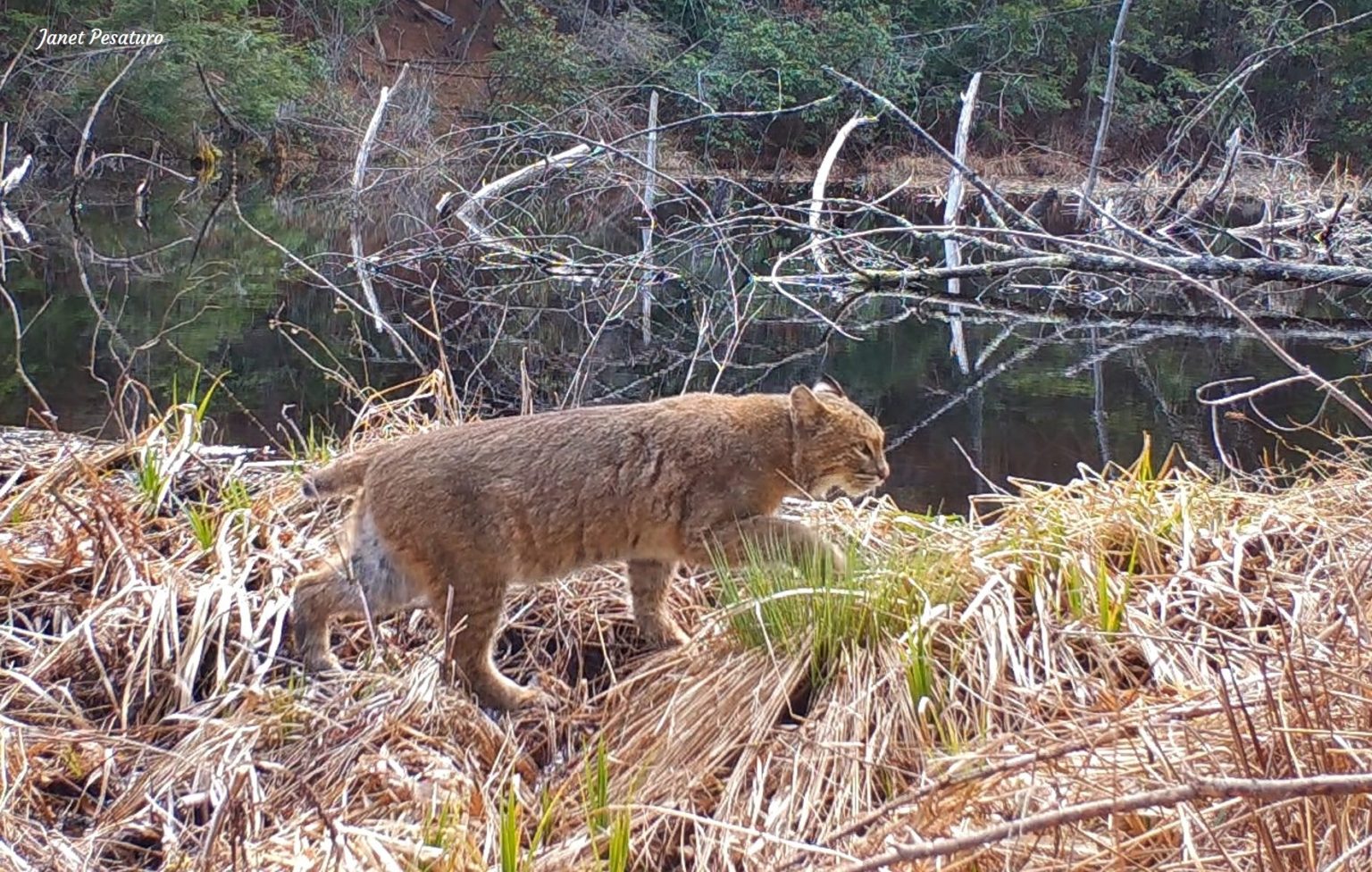Time for another episode of that loved Sunday morning show “Beavers and any other species. Ever” This morning we’re featuring the bobcat, which enjoys visiting beaver ponds to hunt. Of course there’s lots to eat around a beaver pond – or in it. Enos Mills wrote about a fight between a bobcat and a beaver where the beaver actually WON. So its good not to set your sights too high.
The beaver is peaceful. Although the males occasionally fight among themselves, the beaver avoids fighting, and plans his life so as to escape without it. Now and then in the water one closes with an otter in a desperate struggle, and when cornered on land one will sometimes turn upon a preying foe with such ferocity and skill that his assailant is glad to retreat. On two occasions I have known a beaver to kill a bobcat.
Well Bobcats may need beavers, but the feeling isn’t mutual. Here’s a nice look at how beavers matter to their short tailed neighbors from camera trap expert and FB friend Janet Pesaturo.
Bobcats and Beaver Ponds
 The bobcat (Lynx rufus) is the most successful of North America’s wild felines, and one reason for its success is its diet. Like its cousin the Canada lynx, the bobcat relishes a meal of rabbit or hare, but takes a wide variety of prey and can even thrive where rabbits and hares are scarce. In New England, bobcats seem especially common at beaver ponds.
The bobcat (Lynx rufus) is the most successful of North America’s wild felines, and one reason for its success is its diet. Like its cousin the Canada lynx, the bobcat relishes a meal of rabbit or hare, but takes a wide variety of prey and can even thrive where rabbits and hares are scarce. In New England, bobcats seem especially common at beaver ponds.
That’s no surprise, given that beaver wetlands are hot spots for a wide variety of animals, including ducks, geese, frogs, snakes, fish, muskrats, voles, raccoons, mink, otter, deer, moose, and bears. Bobcats hunt the adults, young, and/or eggs of many of these species, and the vegetation around beaver ponds facilitates the feline hunting style. When beavers cut trees around the pond, more sunlight reaches the forest floor. This stimulates growth of stump sprouts, saplings and shrubs, which create the low cover that bobcats need for stalk and ambush hunting.
Color me not at all surprised! The beaver pond is the grocery story where other animals go to shop. Or be shopped. And you don’t need to wear a mask either. (Although the raccoon does).
[wonderplugin_video iframe=”https://youtu.be/uPkSQbPgYWI” lightbox=0 lightboxsize=1 lightboxwidth=960 lightboxheight=540 autoopen=0 autoopendelay=0 autoclose=0 lightboxtitle=”” lightboxgroup=”” lightboxshownavigation=0 showimage=”” lightboxoptions=”” videowidth=600 videoheight=400 keepaspectratio=1 autoplay=0 loop=0 videocss=”position:relative;display:block;background-color:#000;overflow:hidden;max-width:100%;margin:0 auto;” playbutton=”https://www.martinezbeavers.org/wordpress/wp-content/plugins/wonderplugin-video-embed/engine/playvideo-64-64-0.png”]
Bobcats may hunt anywhere around the pond, so there’s a good chance of getting one with a trail camera facing down the pond edge. However, to significantly increase the likelihood, target the beaver dam, for bobcats (like many other animals) regularly use them as bridges to cross the water. To further increase the odds, find a beaver dam near the type of cover bobcats prefer for resting and denning. Dense thickets or cliff refugia fit the bill.
One of the many benefits to the landscape of having beavers. Truly beavers are the job creators of the animal kingdom. Watching a beaver pond means never knowing what you’ll see next. Bobcats are wild neighbors, even in Martinez. Keeping an eye out for them is well worth your time. Although it’s not every day you’ll see something like his:
[wonderplugin_video iframe=”https://youtu.be/gXgNZcWmssg” lightbox=0 lightboxsize=1 lightboxwidth=960 lightboxheight=540 autoopen=0 autoopendelay=0 autoclose=0 lightboxtitle=”” lightboxgroup=”” lightboxshownavigation=0 showimage=”” lightboxoptions=”” videowidth=600 videoheight=400 keepaspectratio=1 autoplay=0 loop=0 videocss=”position:relative;display:block;background-color:#000;overflow:hidden;max-width:100%;margin:0 auto;” playbutton=”https://www.martinezbeavers.org/wordpress/wp-content/plugins/wonderplugin-video-embed/engine/playvideo-64-64-0.png”]






































